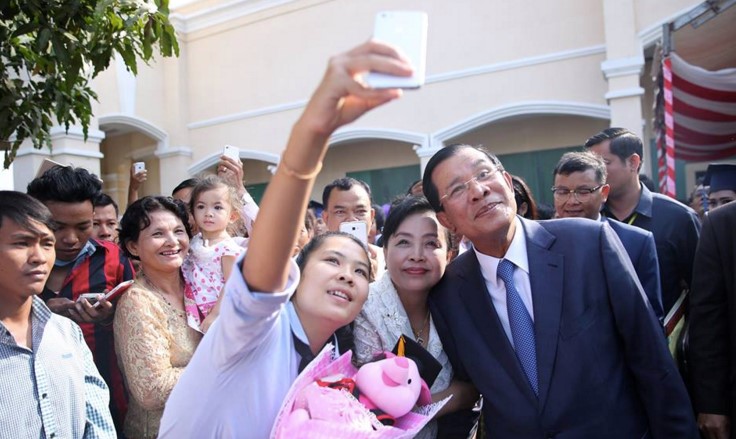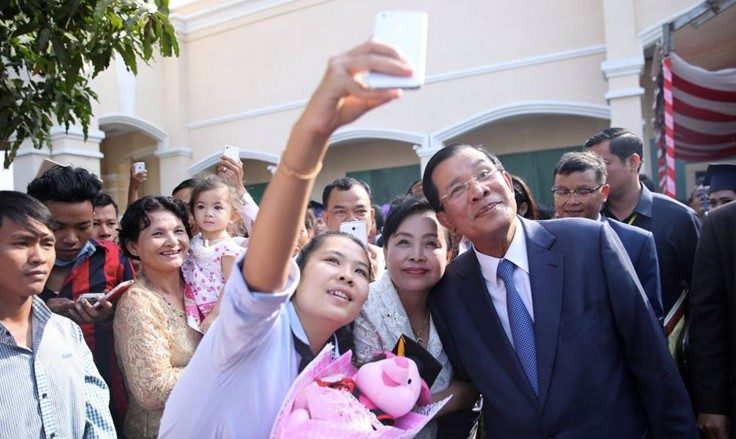
Cambodia PM Hun Sen poses for a selfie. Photo from his Facebook page.
Facebook is a powerful tool in Cambodia, and the nation’s political leaders are all too aware of it. Caitlin McCaffrie reports.
Cambodia’s Prime Minister Hun Sen has the second highest level of Facebook ‘engagement’ of any world leader, according to social media monitoring site Social Bakers.
This level of engagement is unsurprising for anyone connected to the PM’s Facebook account, as he regularly posts photos from meetings he attends, selfies from hospital beds, photos of himself playing golf or relaxing at home with his family.
In addition to self-promotion, the Prime Minister also regularly uses the social media site to announce policy changes, often as a first port-of-call. In January, a week after enacting a long-awaited and generally unpopular new traffic law, the PM responded to public outcry by posting a video to his page cancelling the need for a drivers licence for anyone driving a motorbike of 125cc, declaring that anyone who had already purchased a licence should request a refund.
Such populist policy amendments may seem minor, however they create a belief that laws are malleable and that the Prime Minister wields ultimate control. Furthermore, Hun Sen’s regular Facebook ‘engagements’ work to weaken state institutions.
Last week two people arrested over an ongoing land dispute in Kampong Speu were released on bail a mere hour-and-a-half after Hun Sen called for their release on Facebook.
As well as being used to boost popular support, Facebook has also been used to target dissent. Earlier this month a teenager who made a post calling for a “colour revolution” was sentenced to 18 months imprisonment. Defamation suits based on Facebook posts are becoming increasingly common, and the Deputy Opposition Leader Kem Sokha is currently embroiled in a Facebook scandal of his own, after an anonymous source posted audio he alleges is of Sokha and a mistress.
Although only 33 per cent of Cambodians have access to the Internet, according to Asia Foundation data, 94 per cent of those who do have internet access have a Facebook account. Not only do Cambodians use Facebook for social networking, they also overwhelmingly use it as a source of news: approximately a quarter of all Cambodians use the platform as their primary source of news.
Cambodia’s two main political parties have been tapping into Facebook to boost their popularity since the 2013 election. For a long time, the opposition Cambodian National People’s Rescue Party (CNRP) has had a stronger Facebook presence and closer ties to the youth vote. Many attribute CNRP leader Sam Rainsy’s use of Facebook as a key reason for his party’s significant jump in the polls three years ago.
Since much of Cambodian media is still controlled by the state, the CNRP was forced to turn to social media accounts to get their message out, and their strategy was a huge success with the youth. As two-thirds of the Cambodian population is aged under 30, this is a critical market.
With the 2018 elections fast approaching, the CPP has been actively working to tap into the market traditionally held by the Opposition. Although an account linked to Hun Sen’s name has been around for a few years, he only officially acknowledged ownership of it once it surpassed one million ‘likes’ in September 2015.
For many years Sam Rainsy outranked the self-proclaimed “Father of Facebook” in terms of numbers of followers. However since January Hun Sen has held the lead, and as of writing he outstrips his opponent by some 400,000 ‘likes’. Recently though, these numbers have been called into question.
Analysis conducted by Social Bakers and published in the Phnom Penh Post revealed that only 56.3 per cent of the Prime Minister’s ‘likes’ were from Cambodian accounts. His overseas support doubled in the last month, with most support originating in India, the Philippines, Myanmar and Indonesia, bringing Hun Sen’s total foreign support to 1.25 million from an approximate total of 3 million.
The data revealed that Sam Rainsy significantly outranks Hun Sen for domestic support, and commentators were quick to suggest that the Prime Minister has been paying for overseas ‘click-farms’ to boost his numbers — an allegation he has publicly denied, claiming the support reflects his popularity overseas.
It remains to be seen whether the recent allegations of ‘like-buying’ will harm Hun Sen’s well-constructed image. Regardless, the policy of governing via social media seems set to continue in Cambodia. On 18 March a cabinet reshuffle was announced through a letter posted to the Facebook page of the Counsel of Ministers, in a move which is becoming typical.
With the 2018 election fast approaching it seems most of the race will play out on social media; for better or worse.
Caitlin McCaffrie has an interest in Southeast Asian regional politics and is currently based in Phnom Penh, Cambodia where she works on fair trial rights and justice issues.
 Facebook
Facebook  Twitter
Twitter  Soundcloud
Soundcloud  Youtube
Youtube  Rss
Rss 